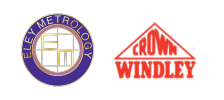Through the application of science, technology and mathematics, engineers provide solutions to real-world problems. But why is metrology, the science of measurement, so critical and how does it benefit engineers?
In this article, we will examine the application of metrology in engineering and explore its role within the engineering world.
Basis for Metrology
Very early in school, we are taught about measurement because it is a skill that we will continue to use throughout our personal lives and careers. This is especially true in engineering, whose excellence hinges on the ability to measure and quantify with accuracy and precision. From the initial design concepts to the final manufactured product and its subsequent maintenance, measurements are taken at every stage of the engineering lifecycle.
Metrology serves as the foundational discipline of accuracy and precision, underpinning the overall quality of design and production. Its principles and applications are not confined to a single engineering domain but are relevant in every industry. It is vital to safety-critical sectors such as nuclear, aeronautical and medical.
Originating from the basic human need for standardised units, particularly for trade and commerce, the field of metrology has evolved into a scientific discipline with global collaboration. Agreement on standards and practices underpin economic development. Today, metrology facilitates trade and commerce, scientific research and development, manufacturing and engineering, as well as safety and reliability.
Application of Metrology
Engineering critically depends upon key metrology principles to ensure that innovation and quality can proceed optimally without interference from poor or absent measurement.
Using accuracy to ensure that a measurement is close to its true value and precision to ensure repeatability, engineers can apply their knowledge and skills to innovation and production with the control, validation and verification needed to minimise errors, waste and costs.
Of course, basic metrology encompasses more than these terms. Some other terms benefitting engineers include:
- Traceability, which is essential for linking measurements back to reference standards.
- Tolerance defines the acceptable range of variation for a component.
- Error uncertainty, for identifying and quantifying uncertainties in measurements, allowing for more reliable engineering decisions.
- Root cause analysis, which helps pinpoint non-conforming features and deviations from design specifications, enabling corrective actions and preventing recurring errors.
When it comes to innovation, engineers apply their knowledge to solve problems for the benefit of society. Engineering design is a discipline where metrology enables engineers to formulate their solutions with less guesswork, verify their assumptions and validate their work.
Today, by using technology, engineers can simulate designs digitally before producing a prototype and subsequently entering production. This would be impossible without metrology.
During manufacturing, metrology ensures that produced parts meet the stringent specifications detailed in engineering designs. Regular quality checks, both during and after production cycles, also ensure that output passes quality assurance and that any problems affecting quality are recognised and rectified as quickly as possible.
Interventions usually require ad-hoc measurements. This makes metrology critical to the cost-effectiveness and profitability of manufacturing.
A variety of metrology tools, ranging from basic instruments like callipers and micrometers to more advanced technologies such as coordinate measuring machines (CMMs) and optical comparators, are employed to ensure that product characteristics, including dimensional accuracy and surface quality, are within specified tolerances.
The production process relies heavily on metrology to deliver the quality control described above. Without this ability, production costs would be higher, output volumes would be lower, and economies would not be as healthy. As an engineer, being able to investigate problems, provide solutions and contribute to quality discussions is essential. Understanding metrology will enable an engineer to measure, interpret readings and translate them into solutions and effective communication for other stakeholders in the business.
While the act of measuring values is invaluable, engineers also benefit from a metrology process known as calibration. Calibration is used to ensure that the accuracy of the measuring equipment is maintained, establishing a comparison against known standards and guaranteeing that decisions about product quality are based on reliable data.
Without proper calibration, the risk of accepting defective products or rejecting good ones in production increases. The traceability of calibration is also essential, ensuring that all factors contributing to a measurement are known to the engineering team.
Safety and Reliability
Safety and reliability are two key characteristics that engineers frequently address. Society depends on them for well-being and economic wealth. For any engineer, the phrase safety-critical should prompt a different mindset, where designs, procedures and processes are tightened in favour of safety.
This applies to sectors such as aerospace, medical devices, and nuclear power. As mentioned in previous blog posts, any error in the measurements of one component in a complex system, such as an aeroplane or nuclear power station, can have devastating consequences for many people.
For this reason, metrology is also tightened through policy in these sectors. Metrology training, documentation of measurements, adherence to standards, traceability and auditing are expected not only for engineering excellence but also for regulatory and legal compliance.
Regulatory and Legal Compliance
Many industries have stringent regulations regarding measurement accuracy and traceability; a solid grasp of metrological principles helps engineers meet these requirements. Legal metrology, which is concerned with ensuring the accuracy of measurements that impact trade, health, safety and the environment, underscores the importance of adhering to established standards.
Compliance with quality standards, such as those established by the International Organization for Standardization (ISO), is also facilitated by a strong understanding of metrology, which ensures product reliability and customer satisfaction.
Career Progression and Success
Lastly, it is worth mentioning that engineers are employed for their knowledge and skills. Understanding metrology and having the ability to practice and communicate the discipline will help an individual progress in their engineering career, offering invaluable skills important in nearly every facet of engineering – especially in safety-critical sectors.

Jeff Eley is the founder and managing director of Eley Metrology, a leading company in the precision measurement industry. With decades of experience in metrology, Jeff has established himself as a respected figure in the field. Under his leadership, Eley Metrology has become renowned for its expertise in coordinate measuring machines (CMMs), digital height gauges, and granite metrology products. Jeff’s vision has driven the company to develop innovative solutions, including custom-designed CMMs and the flagship long-bore measurement machine (LBM). His commitment to excellence and customer-centric approach has positioned Eley Metrology as a trusted provider of high-precision measurement tools and services for industries such as aerospace, automotive, and manufacturing.



